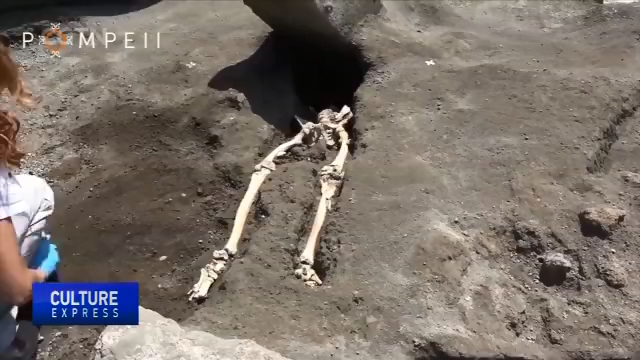
18:48, 12-Jun-2018
Secrets of Pompeii: Archaeologists discover skeleton of man who survived eruption
04:46

There are other struggles in life, that often get covered up, especially when it comes to mother nature. Guatemala is still REELING from the eruption of its Fuego volcano. More than 100 have been killed since the explosion earlier this month, which continues to spew lava, toxic gases and shower ash over a vast area. Many SIMILARITIES have been made with the ancient Italian town of Pompeii, which was famously covered in volcanic ash, after the eruption of Mount Vesuvius in 79 AD. Archeologists recently DISCOVERED the bones of a man crushed by an enormous stone while trying to flee the explosion. It's just the latest in a series of amazing excavations in the last few months. Natalie Carney has more from the ancient ruins and UNESCO world heritage site.
The ancient city of Pompeii is visited by over 3 million people annually, making it one of the most popular historic attractions in Italy.
Almost two thousand years ago, Volcano Vesuvius erupted, spewing out fast-moving currents of hot gas and volcanic matter known as pyroclastic flow that buried the entire city and froze it all in time.
Two centuries of excavations have revealed remarkable truths about how the Romans lived two thousand years ago.
PIETRO OAMITRANO MAYOR OF POMPEII "Pompeii has 66 hectares of total territory. 44 have already been excavated so 22 still have to be excavated and this section is part of this. So you can imagine how many things you can still find.”
The Fuggiasco or the fugitive is just the latest in exciting archaeological discoveries here.
NATALIE CARNEY POMPEII, ITALY "So this is the actual location where the skeleton was found. Now what makes this particular archeological find so interesting is in the way they assume this particular individual passed. Here as you can see there is a layer right here of volcanic material. This was the first eruption. The skeleton was found on top of this. So clearly he was able to escape the first explosion from the volcano, but not the second. As well even more interesting was the fact that a bolder was found in the location of where his head should have been. The head has yet to be recovered.”
Experts believe Fuggiasco fled into a small street, known as "street of balconies" to take cover after escaping that first eruption, but was caught by a pyroclastic flow, throwing him back.
FRANCESCO MUSCOLINO ARCHAEOLOGICAL OFFICER "Perhaps the skeleton was struck by a block, but we don't know if he was already dead when the block fell on him."
A deformed tibia could have also hindered Fuggiasco ability to run fast.
Interestingly, he was discovered carrying a pouch holding at least 20 silver coins and 2 bronze coins, equivalent to around 500 euros in today's currency. He was also carrying what appeared to be his house keys.
Archeologists believe these discoveries tell us how much we still have in common with our late late ancestors.
AUSILIA TRAPANI ARCHAEOLOGIST IN CHARGE OF ARCHIVES "These for example are two door locks. One is bronze and iron, the other is only iron. The interesting part is that the restoration will probably tell us that these two sections made of iron, in particular, you can see on this one, is probably what is left of their keys. They were still inside the lock at the moment of the eruption."
An election sign was also found near the skeleton.
FRANCESCO MUSCOLINO ARCHAEOLOGICAL OFFICER "So it's Elvio Sabino, it was the name of the magistrate. Is worthy of the state, is a good man, I pray to elect him."
"So it was like an electoral campaign poster."
Francesco: "Yes! Yes!"
Oil lamp holders, plates, pots, amphorae and other terracotta figurines have also been recovered from these latest excavations, fascinating tourists and locals alike.
PIETRO AMITRANO MAYOR OF POMPEII "Mount Vesuvius is our father. We must somehow thank him. He covered the city, the entire city in a particular way so that we can see Pompeii as we are today. He didn't destroy it."
But can Mount Vesuvius erupt again?
Volcanologists say its last explosion was in 1944. While there was little damage at that time, Mount Vesuvius is still an active volcano and yes, will erupt again. Natalie Carney, CGTN, Pompeii, Italy.

SITEMAP
Copyright © 2018 CGTN. Beijing ICP prepared NO.16065310-3
Copyright © 2018 CGTN. Beijing ICP prepared NO.16065310-3